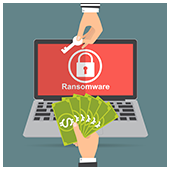 Popcorn Time is taking ransomware to a new level of devilish trickery by asking victims to give up two of their friends for a chance to rid their own computers of the virus. In cyber security this level of diabolical blackmail represents a new and scary trend for hackers. For more information on how Popcorn Time works and what you can do to keep it off your system, keep reading.
Popcorn Time is taking ransomware to a new level of devilish trickery by asking victims to give up two of their friends for a chance to rid their own computers of the virus. In cyber security this level of diabolical blackmail represents a new and scary trend for hackers. For more information on how Popcorn Time works and what you can do to keep it off your system, keep reading.
Ransomware is nothing new. Cybersecurity miscreants have been taking advantage of online users for years by requiring payment to “unlock” a victim’s computer. What Popcorn Time does differently is give users the option to spread the virus to two other victims in the hopes that they will pay the ransom — a tactic that promises to double their money at the expense of your sense of morality (and at the expense of your friendships as well).
The Cost of Popcorn
When you inadvertently download this ransomware, you will be met with a screen that explains that your files have been hijacked/encrypted, and that to get them back you will need to pay one Bitcoin for a decryption key that they keep stored remotely. The Bitcoin fee is usually more than $700, a hefty price to pay during any season but particularly difficult for those infected during the holiday season.
Spread the “Holiday Cheer” and Hope they Bite
What makes Popcorn Time unique is the option victims have to take their cost away by allowing the ransomware to affect two of their friends for a chance to get a free decryption code. Of course, it works only if both friends pay the ransom, which leaves you looking (and feeling) like the Grinch.
Avoiding Popcorn Time this Season
The easiest way to avoid downloading ransomware is to stay off of sites that might contain questionable files. However, this is nearly impossible for modern users, and many hackers are getting good at making their files look legitimate. Limit your exposure to potential ransomware by keeping your software up-to-date and your computer protected with a security program from a reputable company (for example Norton or Symantec). If you need to learn more about how to avoid running into ransomware while you’re online, give our professional cybersecurity consultants a call. We’ll keep you away from the popcorn this season.



